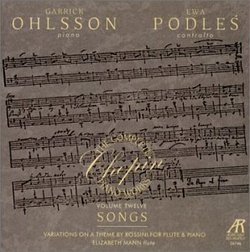| All Artists: Frederic Chopin, Garrick Ohlsson Title: Garrick Ohlsson: The Complete Chopin Piano Works, Vol. 12 - Songs Members Wishing: 0 Total Copies: 0 Label: Arabesque Recordings Original Release Date: 1/1/2000 Re-Release Date: 11/28/2000 Album Type: Import Genres: Pop, Classical Styles: Vocal Pop, Opera & Classical Vocal, Chamber Music, Instruments, Reeds & Winds Number of Discs: 1 SwapaCD Credits: 1 UPC: 026724674624 |
Search - Frederic Chopin, Garrick Ohlsson :: Garrick Ohlsson: The Complete Chopin Piano Works, Vol. 12 - Songs
 | Frederic Chopin, Garrick Ohlsson Garrick Ohlsson: The Complete Chopin Piano Works, Vol. 12 - Songs Genres: Pop, Classical
|
Larger Image |
CD Details |
CD ReviewsSONGS OF INFINITE MELANCHOLY, TRANSIENT JOY Melvyn M. Sobel | Freeport (Long Island), New York | 12/05/2001 (5 out of 5 stars) "That Chopin's Songs have been unjustly neglected and left all but unrecognized as a bonafide set of invaluable individual works of incredible musical and emotional scope is because they have never before been performed.... like this. Podles and Ohlsson give us sublime readings of Chopin's complete Op. 74 (plus the exceptional addition of two more songs that the composer "tossed off" in autograph books of friends--- and were published as late as 1910!) in a critical release of music whose beautiful performances will make it accessible to even those who would prefer root canal surgery rather than listen to vocal repertoire. But once heard, the spell is cast. The pairing of contralto Ewa Podles and pianist Ohlsson is an artistic match that, besides being made in heaven, takes the breath away. What a voice is hers! Such poignant depth, such dark, rich, full-throated hues, such utter command of the myriad colorings of Chopin's inspirations! And, with Ohlsson's thoroughly sensitive accompaniment, Podles is unfettered in her ability to convey the composer's most melancholic despair ("Faded and Vanished")--- with a voice so filled with anguish it could make a stone weep!--- his lyrical sweetness and naivete ("The Maiden's Wish"), his affecting nostalgia ("The Sad River"), charming exhuberance ("A Drinking Song"), wistfulness ("Spring"), love ("My Darling"). The inclusion of the delightful, and even less frequently heard, Variations for Flute and Piano in E gives the CD cheerful closure (much needed after the riveting outpouring of Chopin angst). Elizabeth Mann plays a fine, mellow flute and, again, Mr. Ohlsson is the most giving and unselfish of accompanists. The Arabesque sound throughout is intimate and cocooning; song texts are in both Polish and English; and the liner notes by Frank Cooper are excellent. [Total timing: 57:35]" Chopin's Songs sung by Ewa Podles Walter Tulp | Boston, MA | 01/31/2001 (4 out of 5 stars) "It doesn't matter what voice range Chopin originally scored his 19 songs for. They have been performed by mezzo-sopranos, sopranos, and sometimes with no singer at all, just a lone piano. It was a stroke of genius for Arabesque to have enlisted contralto Ewa Podles to sing them. Good contraltos occur rarely on new releases these days, even more rarely than their male equivalent, the countertenor. Not since Kathleen Ferrier have I heard a contralto mine such quarries of feeling. Her rendition of "Nie Ma Czego grzeba" ("Faded and Vanished") is so melancholic, so early Romantic, that it could have been penned by Franz Schubert. The melismas at the end of each stanza extracted tears from me, a feat that hasn't occurred in recent memory. Her rendition of "Out of My Sight" dramatically conveys the conflicting emotions of one lover parting from another. Elly Ameling and Dietrich Fischer-Dieskau sing Schubert lieder with similar finesse, pacing, and eloquence. Scholars disagree, but Chopin appears to have written most of these songs in two periods, 1829-1831 and 1847. The early ones were old-fashioned even for their time. Because of their strophic style and naïve folk elements, they belong more to the pre-lied era of the late 18th century. Only in songs like "Melodia" (1847) does Chopin approach the emotional depth of the emerging art song. The piano works he composed at the same time blazed more brightly, popularizing such obscure forms like the nocturne. That said, I believe it is a pity Chopin didn't write more of these excellent songs. They transcend the limited forms in which he fit them. They are morose ("The Two-Fold End", raucous ("Drinking Song"), martial ("The Warrior"), even slightly earthy ("Lithuanian Song"). Pianist Garrick Ohlsson, who has performed in the previous 11 volumes of this series, proves an excellent accompanist. His technique is sensitive, well paced, and flamboyant only when required, never showy. Like pianist Gerald Moore, he never draws attention from the vocal pyrotechnics of his singer. The final piece, "Variations in E Major for Flute and Piano" (for "Non piu mesta" from Rossini's La Cenerentola) is a charming trifle composed when Chopin was fourteen. Although a bit anti-climactic after these marvelous songs, the piece shows that Chopin, while not a child prodigy like Mozart or Mendelssohn, was clearly on the way to greatness. Flautist Elizabeth Mann and Ohlsson render the piece well. Compulsive Chopin collectors will be happy to have it."
|

 Track Listings (20) - Disc #1
Track Listings (20) - Disc #1